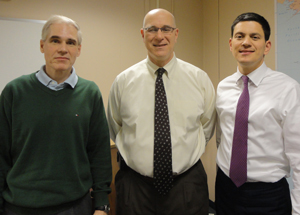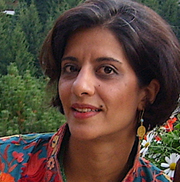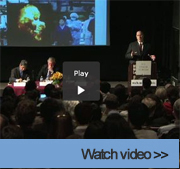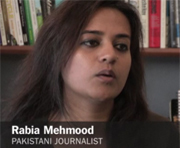CIS Welcomes Wilhelms

Robert E Wilhelm Fellows: Dr. Hans-Georg Eichler (far left) and David Miliband (far right) with Richard Samuels.
Rt Hon David Miliband MP joined CIS as a Robert E. Wilhelm Fellow in Residence from April 11 – April 15, 2011. Miliband was the Foreign Secretary for the United Kingdom from 2007 to 2010 and is an alumnus of the Department of Political Science at MIT.
"This is a wonderful opportunity to have a distinguished practitioner here to visit with students and faculty at MIT. It’s an honor for the Center to host his visit and we look forward to his time with us," said Richard Samuels, director of CIS and Ford International Professor of Political Science.
Miliband is a British Labour Party politician who has been the Member of Parliament (MP) since 2001, and was the Secretary of State for Foreign and Commonwealth Affairs from 2007 to 2010. Miliband studied at Oxford University and Massachusetts Institute of Technology, and started his career at the Institute for Public Policy Research. At 29, Miliband became Tony Blair's Head of Policy and was a major contributor to the Labour's manifesto that brought the party to power in 1997. Blair appointed him head of the Prime Minister's Policy Unit from 1997 to 2001. After several more posts, he was named the Environment Secretary. As Environment Secretary, Miliband consolidated climate change as a priority for UK policymakers. On the succession of Gordon Brown as Prime Minister, Miliband was promoted to Foreign Secretary, at 41, the youngest person to hold the post since David Owen 30 years earlier. In September 2010 Miliband narrowly lost the Labour leadership election to his brother.
Also at CIS as a Wilhelm Fellow through December 2011 is Hans-Georg Eichler. Eichler is the Senior Medical Officer of European Medicines Agency (EMA). As a Wilhelm Fellow, he will collaborate with the MIT community in research, seminars, conferences, and other intellectual projects. Eichler also will work closely with the MIT Center for Biomedical Innovation (CBI)—as a CBI Visiting Scholar—on the New Drug Development Paradigms (NEWDIGS) initiative.
Eichler’s joint appointment with CIS and CBI, and the close partnership between the two Centers are mirrored in his work, which will be cutting across national boundaries and biomedical industry stakeholders.
Prior to joining the EMA, Eichler was at the Medical University of Vienna in Austria for 15 years, where he was vice-rector for Research and International Relations and Professor and Chair of the Department of Clinical Pharmacology. He also served as president of the Vienna School of Clinical Research and co-chair of the Austrian Social Security Association Committee on Reimbursement of Drugs. His industry experience includes work with Ciba-Geigy Research Labs and Outcomes Research at Merck & Company. Eichler graduated with an M.D. from Vienna University Medical School and a Master of Science degree in Toxicology from the University of Surrey in Guildford, U.K. He trained in internal medicine and clinical pharmacology at the Vienna University Hospital and Stanford University.
A generous gift from Robert E. Wilhelm supports the Center’s Wilhelm fellowship. The fellowship is awarded to individuals who have held senior positions in public life and is open, for example, to heads of non-profit agencies, senior officials at the State Department or other government agencies, including ambassadors, or senior officials from the UN or other multilateral agencies.
Anderlini Becomes CIS Senior Fellow

Sanam Anderlini
Sanam Anderlini is one of the world's most respected experts on gender and security. She currently serves as the Senior Gender, Peace, and Security Advisor on the U.N.'s Mediation Standby Team. She is the co-founder of the International Civil Society Action Network (ICAN), a US-based NGO dedicated to supporting civil society activism in peace and security in conflict-affected countries. For over a decade she has been a leading international advocate, researcher, trainer, and writer on conflict prevention and peacebuilding, working with women worldwide. In 2000, she was among civil society drafters of UN Security Council Resolution 1325 on women, peace and security. Between 2002-2005, as Director of the Women Waging Peace Policy Commission, Anderlini led ground-breaking field research on women's contributions to conflict prevention, security and peacemaking in twelve countries. Since 2005, she has also provided strategic guidance and training to key UN agencies, the UK government, and NGOs worldwide, including lead consultant for a UNDP global initiative on "Gender, Community Security and Social Cohesion."
She has served on the Advisory Board of the UN Democracy Fund (UNDEF), and in 2010 she was appointed to the Civil Society Advisory Group (CSAG) on Resolution 1325, chaired by Mary Robinson. Her most recent book, Women Building Peace: What they do, why it matters, was published by Lynne Rienner in 2007. She was lead author on the joint CIS-ICAN study, "What the Women Say: Participation and UNSCR 1325," which was launched at the U.S. Mission to the U.N. in October 2010. A native of Iran, she holds degrees from Oxford Brookes and Cambridge University.
Japan's Nuclear Crisis
At a Starr Forum on March 16, MIT experts addressed Japan's nuclear past, present, and future from a political and engineering perspective. Guest speakers included:
Richard Samuels, Ford International Professor of Political Science and director of CIS; Kenneth Oye, associate professor of political science and engineering systems; and
Michael Golay, MIT professor of nuclear science and engineering.
“As best as I can tell, people have been reasonably straightforward in revealing what is going on,” said Kenneth Oye, an associate professor of political science who was in Japan during the earthquake and for a few days afterward. However, he noted, in the past Japan has had “a culture and a system that has often valued secrecy and covered up problems,” which has proven problematic in significant ways relating to the current crisis.
While the ongoing problems with the Fukushima Daiichi nuclear power plant remain extremely serious, in its overall emergency response for people affected by the earthquake and subsequent tsunami, “the government has learned and benefitted from the mistakes of the past,” said Richard Samuels, Ford International Professor of Political Science at MIT and director of CIS. Samuels noted that 100,000 troops have been mobilized for the larger relief effort.
However, as Samuels also remarked, “it remains to be seen if government will be up to the task.” (partial excerpt from an MIT News Office article posted on March 17, 2011)
CIS on OBL's Death
CIS members responded to the death of Osama Bin Laden in various formats:
The Security Studies Program co-sponsored with the Department of Political Science a Wednesday Seminar, "The Post Osama Bin Laden Era." The roundtable discussion included: Barry Posen, director, Security Studies Program; Gabriel Lenz; Vipin Narang; Roger Petersen; Stephen van Evera; and Charles Samaris, a Colonel with the US Army and a SSP Military Fellow.
CIS senior fellow Christian Caryl wrote The President’s Triumph: Obama Gets His Man; Fotini Christia, assistant professor of political science, discussed with the MIT News Office the implications of OBL's death for the war in Afghanistan and U.S.-Pakistan relations. Melissa Nobles, the Arthur and Ruth Sloan Professor of Political Science, was featured on WGBH's Basic Black, Peter Krause, PhD candidate in political science, was featured on NECN regarding the OBL videotapes; and the New York Times's spoke with Pakistani journalist Rabia Mehmood (the current CIS Neuffer Fellow) on Pakistani media and its response.





